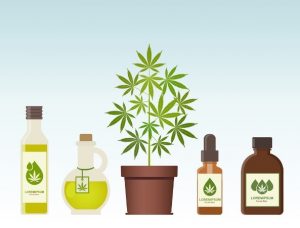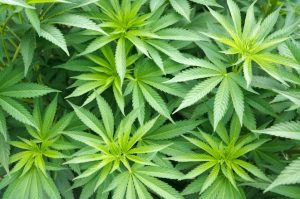The Truth About Hemp Oil and CBD Products
Author: Dr. Stephen Chaney
 CBD products are hot. If you believe the hype, they cure just about anything that ails you. Plus, they are “natural,” and the public has an insatiable appetite for natural cures. If that weren’t enough, marijuana has had a long history as an illicit drug, which adds a little allure to CBD products. The CBD industry is exploding.
CBD products are hot. If you believe the hype, they cure just about anything that ails you. Plus, they are “natural,” and the public has an insatiable appetite for natural cures. If that weren’t enough, marijuana has had a long history as an illicit drug, which adds a little allure to CBD products. The CBD industry is exploding.
But, is hemp oil good for you?
Many of you have contacted me and asked for my opinion on CBD products. Up until now I have deferred because it was simply not an area of expertise for me, and I had not come across any good studies on the effects of CBD.
However, I recently came across a comprehensive review of the evidence behind CBD and cannabis by experts I trust. This was a report called “The Health Effects of Cannabis and Cannabinoids. The Current State of Evidence and Recommendations for Research” published by the National Academies of Sciences, Engineering, and Medicine (National Academies Press, Washington DC, 2017 ).
Before I describe the findings of the report, I need to define some terms for you.
What Are Cannabis And Cannabinoids
 Cannabis is a genus of flowering plants that originated in Central Asia. Cannabis plants contain a class of compounds called cannabinoids, of which the two most abundant are tetrahydrocannabinol (THC) and cannabidiol (CBD). It is THC that is responsible for the intoxicating effects of cannabis.
Cannabis is a genus of flowering plants that originated in Central Asia. Cannabis plants contain a class of compounds called cannabinoids, of which the two most abundant are tetrahydrocannabinol (THC) and cannabidiol (CBD). It is THC that is responsible for the intoxicating effects of cannabis.
The term hemp refers to varieties of Cannabis that have been selected for non-drug use. Hemp is low in THC and high in CBD. Marijuana, on the other hand, is high in THC and low in CBD.
How Was The Report Prepared?
 The National Academy of Sciences selected 16 of the top experts in this area of research. These experts reviewed hundreds of published studies, met several times to discuss the studies, and wrote a comprehensive, 468-page report based on their evaluation of the data. This report was then sent to another group of 15 experts to be reviewed and edited before final publication.
The National Academy of Sciences selected 16 of the top experts in this area of research. These experts reviewed hundreds of published studies, met several times to discuss the studies, and wrote a comprehensive, 468-page report based on their evaluation of the data. This report was then sent to another group of 15 experts to be reviewed and edited before final publication.
The report evaluated the scientific basis for:
- Claims for benefits of CBD and/or THC that have been proposed by their advocates.
- Claims for risks of CBD and/or THC that have been proposed by their opponents.
The strength of the evidence behind these claims was classified as follows:
- Conclusive Evidence: The claim was supported by many good-quality studies with no credible opposing findings.
- Substantial Evidence: The claim was supported by several good-quality studies with few or no credible opposing findings.
- Moderate Evidence: The claim was supported by several good- to fair-quality studies with few or no opposing findings.
- Limited Evidence: The claim is supported by fair-quality studies or study results have been mixed, with more studies supporting the claim than refuting it.
- Insufficient or No Evidence: The claim is supported by a single poor-quality study, study results have been mixed, or no studies have been done to either support or refute the claim.
Is Hemp Oil Good for You?
 The report lumped all claims for any form of cannabis or cannabinoids together. This includes the cannabis plant, CBD, THC, preparations containing both THC and CBD, and everything in between. I will help you sort out which approved claims were associated with which form of cannabis.
The report lumped all claims for any form of cannabis or cannabinoids together. This includes the cannabis plant, CBD, THC, preparations containing both THC and CBD, and everything in between. I will help you sort out which approved claims were associated with which form of cannabis.
Benefits: The report stated that there was:
- Conclusive evidence that a high potency pharmaceutical CBD drug helps prevent seizures in two rare and severe forms of epilepsy. (This is a patented drug formulation and is not found in commercially available CBD preparations.)
- Conclusive evidence that THC or a combination of THC with CBD is effective for treating chemotherapy-induced nausea and vomiting. (These studies were not done with CBD by itself).
 Substantial evidence that THC or a combination of THC with CBD is effective for treating involuntary muscle contractions due to multiple sclerosis. (These studies were not done with CBD by itself).
Substantial evidence that THC or a combination of THC with CBD is effective for treating involuntary muscle contractions due to multiple sclerosis. (These studies were not done with CBD by itself).- Substantial evidence that THC or a combination of THC with CBD is effective for treating chronic pain. (These studies were not done with CBD by itself).
- Moderate evidence that THC or a combination of THC with CBD may help with certain sleep problems. (These studies were not done with CBD by itself).
- Limited, insufficient, or no evidence to support claims for CBD products by themselves.
The reviewers did not say that CBD products were worthless. They simply concluded that the existing studies were not strong enough to rate the evidence supporting CBD claims in the moderate to conclusive range.
For example, the reviewers described a study reporting that 300 mg of CBD reduced anxiety for men giving a speech. It was a very small study, the data were inconsistent, and an effect of CBD on anxiety has not been supported by other studies. Thus, the reviewers concluded that the evidence supporting a claim that CBD reduces anxiety is insufficient. Of course, that may change as future studies are published.
In short, the reviewers felt that, while there may be benefits derived from CBD, more high-quality research is needed to either support or refute the claims that are currently being made for CBD products.
Risks: The report did not list any studies substantiating risks associated with CBD use.
 The reviewers did state that CBD blocks an enzyme that metabolizes many medicines, raising the possibility that CBD might affect the effectiveness of those medicines. They said that more research into these potential interactions was sorely needed. (Note: Many widely used herbal supplements block the same enzymes, so this effect is not unique to CBD products.)
The reviewers did state that CBD blocks an enzyme that metabolizes many medicines, raising the possibility that CBD might affect the effectiveness of those medicines. They said that more research into these potential interactions was sorely needed. (Note: Many widely used herbal supplements block the same enzymes, so this effect is not unique to CBD products.)
The reviewers also noted two other concerns that CBD products have in common with many herbal supplements:
- The amount of CBD used in clinical studies is generally 100 mg or more, while many CBD products provide 20 mg or less.
- Quality control is spotty at best. One recent study (MO Bonn-Miller et al, JAMA, 318: 1708-1709, 2017 ) evaluated 84 CBD products and found that only 30% of them were accurately labeled. Some contained little to no CBD and about 20% had detectable levels of THC.
What Are The Benefits And Risks Of Marijuana or Hemp Oil?
Benefits: As described in the section above, there is:
- Conclusive evidence that THC or THC + CBD:
- is effective for treating chemotherapy-induced nausea and vomiting.
- Substantial evidence that THC or THC + CBD:
- is effective for treating involuntary muscle contractions due to multiple sclerosis.
- is effective for treating chronic pain.
- Moderate evidence that THC or THC + CBD:
- may help with certain sleep problems.
- Limited, insufficient, or no evidence to support the other claims for THC or THC + CBD.
Risks: The report stated that there was:
- Substantial evidence for:
- Cannabis smoking and more frequent bronchitis episodes.
- Cannabis use and increased frequency of motor vehicle crashes.
- Maternal cannabis smoking and lower birth weight of the offspring.
- Cannabis use and the development of schizophrenia or other psychoses, with the highest risks among the most frequent users.
- Progression to problem cannabis use. The risks are greatest for males, people who initiate cannabis use at an early age, and people who use cannabis frequently.
- Moderate evidence for:
- Cannabis use and the impairment of cognitive domains of learning, memory, and attention.
- Cannabis use and the development of substance dependence and/or substance abuse disorder for substances including alcohol, tobacco, and other illicit drugs.
Once again, the committee concluded that more high-quality research was needed.
For a summary of the report’s evaluation of all claimed benefits and risks of CBD and/or marijuana use, click here . For details on individual studies reviewed by the committee, read the complete report at https://doi.org/10.17226/24625.
The Bottom Line
There is lots of excitement around CBD products and medical use of marijuana (THC). If you believe the proponents, they are a panacea for everything that ails us. If you believe the opponents, the risks far outweigh the benefits. Which of these claims are true and which are false?
Fortunately, the National Academy of Sciences appointed a committee of experts to evaluate the research supporting or refuting the claims. They issued a report in 2017 that evaluated the strength of scientific evidence supporting these claims.
In short:
- They found no good evidence supporting the proposed benefits of CBD products. Nor did they find evidence for any risk of CBD products, properly used. They did not conclude that CBD products were worthless. They simply concluded that more high-quality research was needed to substantiate the claims.
- They found conclusive evidence for some of the proposed benefits of medical marijuana. However, they also found substantial evidence supporting some of the proposed risks. Again, they concluded that more research was needed.
For more details read the article above.
These statements have not been evaluated by the Food and Drug Administration. This information is not intended to diagnose, treat, cure or prevent any disease.
